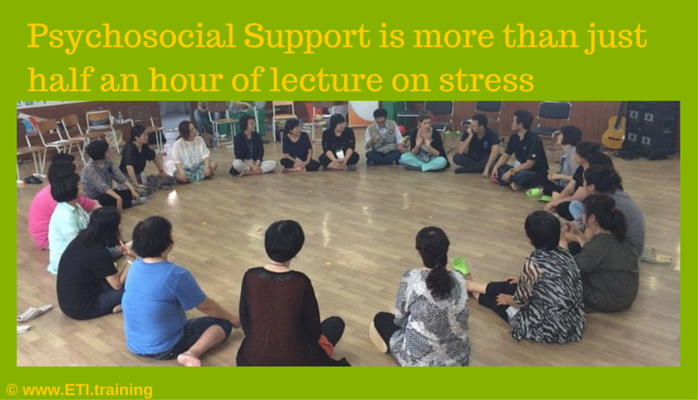The UN Economic and Social Commission for Asia and the Pacific concluded that: "The lessons from 2014 clearly show that building resilience remains a key priority in protecting lives and assets in the Asia and the Pacific."
In the last year and half I have provided psychosocial support trainings in the Philippines, South Korea, China and Japan, for people working in post-trauma and disaster settings. These experiences have greatly strengthened my belief that such training has an important role to play in community resilience and sustainable development programs.
But to achieve impact requires more than passing out a leaflet of tips on resiliency or providing a half hour lecture on stress. Even one full day is not enough. The needs are vast and complex, requiring a segmentation of response.
The most immediate need after disasters is direct support for communities affected, for those suffering from primary trauma. Soon, however, the needs of another community requiring major support inevitably become apparent as well: the networks of caregivers, who work in great jeopardy of secondary trauma.

Both direct community training and training to support traumatized caregivers require several layers of training. 1) Both settings need short, introductory training that targets the largest number of people possible and provides then with basic understanding of trauma, how it impacts people, and ways to mitigate it. 2) Then there is a need for continuing training for service providers that their work requires more in-depth knowledge. 3) Both settings require training of trainers so as to expand the number of teams able to create a well-informed response and care both as prevention and response to community trauma.
Key challenges must be considered. One is the modality of training. I will be writing in future months about data I have collected that call into question the effectiveness of lecture and passive learning as teaching methods with traumatized people.
Additionally, such programs must be culturally adapted to the context. Most existing psychosocial programs are monopolized by western definitions of stress and trauma and what to do about them. Honoring the resources existing within the local context is essential for such programs to be effective.
There is much work ahead to create the structures require to provide such training. But at least we are beginning to see recognition of the importance of efforts to build resiliency after disaster.
More on the UN report at http://bit.ly/1JSxAS2


Comments